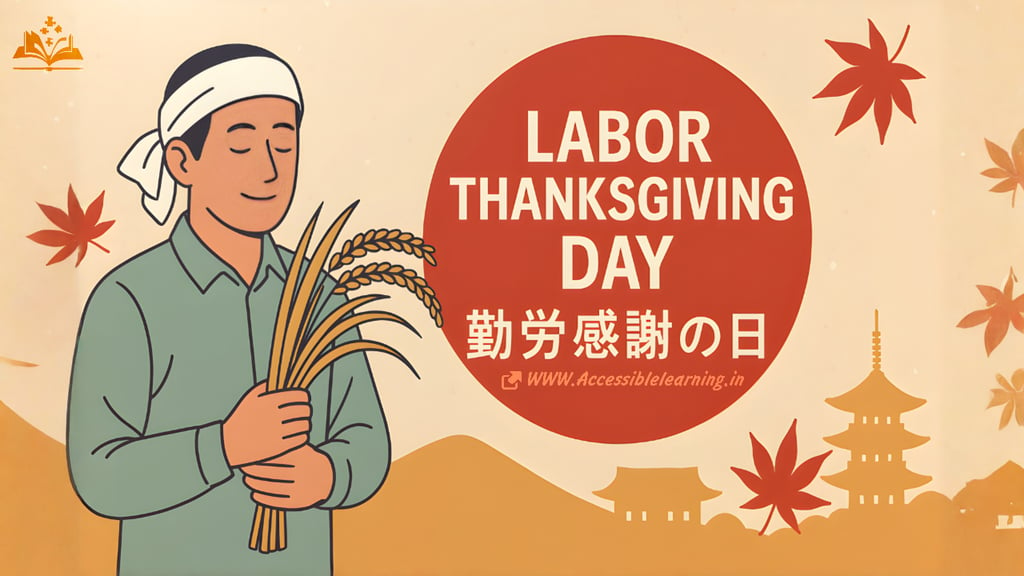
Labor Thanksgiving Day (Kinrō Kansha no Hi): Japan’s Celebration of Work and Gratitude
Labor Thanksgiving Day (Kinrō Kansha no Hi) is Japan’s national holiday celebrated on November 23 to honor hard work, gratitude, and community spirit. Rooted in the ancient Shinto harvest ritual Niinamesai, this day reminds modern Japan to appreciate every worker’s effort, from farmers to professionals and to reflect on harmony, respect, and the true meaning of labor.
CELEBRATION/FESTIVALSCULTURE/TRADITIONEVENT/SPECIALJAPAN
Kim Shin
11/15/20255 min read


Every year on November 23, Japan takes a quiet pause from its fast-paced rhythm to honor something truly universal: work. Not just office jobs or corporate success, but all forms of effort from farmers and factory workers to nurses, teachers, and cleaners.
This day is called Labor Thanksgiving Day, or in Japanese, Kinrō Kansha no Hi (勤労感謝の日), a day dedicated to thanking those who make life run smoothly and reflecting on how every bit of labor shapes society.
Unlike most holidays filled with fireworks or loud parades, Kinrō Kansha no Hi is beautifully humble. It’s a day about quiet gratitude, the kind that sits in your heart and reminds you how much every human effort matters.
Ancient Roots: From Harvest Blessings to Human Effort
Long before it became a modern holiday, Japan already had a deep tradition of giving thanks not to people, but to nature.
Centuries ago, the Japanese celebrated a festival called Niinamesai (新嘗祭), the “Harvest Festival.” It was one of the most sacred Shinto rituals, where the Emperor would offer the season’s first rice to the gods, thanking them for abundance and peace. Afterward, he would eat some himself, symbolizing harmony between the divine, the earth, and humanity.
But after World War II, Japan entered a new era built on democracy and equality. The government reimagined many holidays, transforming old imperial rituals into modern civic celebrations. Thus, in 1948, Niinamesai evolved into Kinrō Kansha no Hi, keeping its spirit of gratitude but shifting the focus from the gods to the people.
The meaning changed, but the soul of the festival stayed the same: appreciation for the blessings of effort and cooperation.
What the Day Means Today
At its core, Labor Thanksgiving Day is about recognizing the dignity of labor every worker, every contribution, and every unseen act that keeps society alive.
It’s not about economic productivity or corporate success. It’s about remembering that behind every convenience your clean street, your meal, your electricity, there’s a human being who made it possible.
This mindset of mutual gratitude gives the day a deeply emotional layer. It’s a moment for people to stop and say, “Thank you for your hard work.”
Simple words, but in a culture that values humility and quiet dedication, they mean everything.
How Japan Celebrates Labor Thanksgiving Day
Even though Kinrō Kansha no Hi isn’t filled with fireworks or feasts, it carries a warmth that’s hard to miss. Here’s how people across Japan celebrate it:
Children Say Thank You
In schools, children often write letters or draw pictures to thank community workers police officers, nurses, and firefighters. Sometimes they visit them personally to deliver their handmade gifts. It’s sweet, genuine, and a beautiful tradition that teaches kids the value of gratitude.
Community Appreciation Events
Local communities organize small exhibitions and ceremonies to honor workers in various industries agriculture, transportation, healthcare, and sanitation. These are simple yet heartfelt events celebrating people who usually go unnoticed.
Workplace Reflection
Many companies use the day to show appreciation to employees. It’s also a chance for teams to relax, talk openly about work culture, and strengthen human connections beyond titles or ranks.
A Day for Family
For many, the best part of the holiday is rest. Families gather, share meals, or go for quiet outings. It’s a time to reconnect, not just to thank each other for their efforts, but to feel that sense of togetherness often lost in daily life.


A Deeper Meaning in Japan’s Work Culture
Japan’s work ethic is famously disciplined, loyal, and relentless. But that dedication has a cost: long hours, burnout, and sometimes even a loss of personal time.
That’s why Kinrō Kansha no Hi is more than symbolic. It’s a much-needed reminder that work is not just about doing but about being. It encourages balance, respect, and care for oneself and for others.
In recent years, this holiday has also become a day of reflection on labor reform, equality, and workplace wellness. It’s not uncommon for people to use this day to discuss issues like fair pay, mental health, and flexible working hours, all part of Japan’s slow but steady shift toward a healthier work culture.
Modern Spirit: Redefining Work and Gratitude
As Japan becomes more digital and global, the meaning of “work” is evolving. Freelancers, creators, caregivers, and tech innovators are reshaping what labor looks like in modern society.
And yet, the heart of Kinrō Kansha no Hi remains unchanged; it’s still about giving thanks for the hands, minds, and hearts that keep the world moving.
Whether it’s a farmer growing rice or an engineer coding an app, the spirit of gratitude unites everyone. It’s not about what kind of work you do; it’s about why you do it and how much it contributes to others’ lives.
A Simple, Profound Message
At the end of the day, Labor Thanksgiving Day is not about ceremonies; it’s about connection.
It’s about pausing to see the invisible threads of effort that hold society together.
It asks us to slow down, reflect, and say a quiet thank-you to our coworkers, to our families, and to ourselves.
Because gratitude doesn’t just make us better workers. It makes us better humans.
Frequently Asked Questions
Q: What is the purpose of Labor Thanksgiving Day in Japan?
Labor Thanksgiving Day celebrates the value of work, respect for human effort, and gratitude for the contributions that keep society running. It’s a day for people to appreciate workers in all professions and reflect on mutual respect and cooperation.
Q: When is Labor Thanksgiving Day celebrated in Japan?
It is celebrated every year on November 23. The date remains the same annually, making it one of Japan’s fixed national holidays.
Q: How is Labor Thanksgiving Day different from Thanksgiving in the United States?
While both holidays share a theme of gratitude, Japan’s Kinrō Kansha no Hi focuses on honoring labor and community contributions, not harvest feasts or family dinners. The U.S. Thanksgiving centers on food and family gatherings, whereas Japan’s version emphasizes appreciation and reflection.
Q: What are the origins of Labor Thanksgiving Day?
The holiday evolved from the ancient Shinto harvest ritual Niinamesai (新嘗祭), where the Emperor gave thanks for the year’s harvest. After World War II, it was redefined as a secular holiday celebrating workers and productivity.
Q: How do Japanese people celebrate Labor Thanksgiving Day today?
Celebrations are modest and community-oriented. Schools and local groups express gratitude to workers through letters, gifts, and small events. Families often spend time together, while companies may hold appreciation meetings or let employees rest.
Q: Is Labor Thanksgiving Day a public holiday in Japan?
Yes. November 23 is a national public holiday, meaning schools, government offices, and most businesses close to allow citizens to rest and reflect.
Q: What is the message behind Kinrō Kansha no Hi?
The day’s message is simple yet profound: every effort deserves appreciation. It’s a reminder that a healthy, respectful, and grateful society depends on recognizing the hard work of all its people, from farmers to engineers.
Subscribe To Our Newsletter
All © Copyright reserved by Accessible-Learning Hub
| Terms & Conditions
Knowledge is power. Learn with Us. 📚


